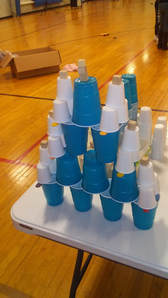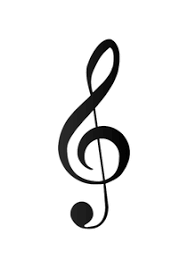HONESTLY, AT the beginning of the activity I was at a bit of a loss for what could be made with the different materials. The attempt above was one of several. Not too bad, if I do say so myself, but yet really not too much when compared to what all the other kids did. There were varying types of "towers," kids making miniature playgrounds, moats around their favorite stuffed animals. What particularly struck me is how creative the kids were with harder to use materials. There were paper clips included in the materials I was given and I was pretty clueless as to how we were expected to use them in combination with everything else we had. The kids were naturals. My attention wasn't just drawn to the kids' ingenuity either, I was struck by the ingenuity of the various different races that were represented as well. Everyone had some good ideas at different ways to use the materials.
CLICK HERE for the whole talk. He talked about the need for humility and its parallels with gender and economic circumstances. Every race has an important contribution in society. Not only that, but there are unique contributions that society will not have, until it is given through specific races and nationalities. NOW WHAT does this have to do with music? As a piano teacher one of the hardest things to teach a kid is rhythm and pacing. Some students rush the eighth notes. Others keep them steady but get bored with half and whole notes and like to skip or rush through the last few beats. It can get rather frustrating sometimes, especially in collaboration projects. In contrast, I've been teaching a student that's part Tahitian. Rhythmic music is everywhere in those cultures. (Jazz is purportedly from African roots). She's always right on the dot on all her rhythms and there is very little that phases her. THIS GOT me thinking. Actual music participation is a very important part of just about every culture. I'm not talking about just putting on a set of earphones and jamming out. I'm talking about actually singing, playing instruments, and being an active part of actual music making. In African cultures, music making is a community event. Everyone has a part to play.
YOU'RE PROBABLY thinking, "so what?" Let me tell you. Studies have found that people who participate in music making actually increase their emotional bond with each other. (I'll include a reference to the study below). It also increases our emotional intelligence. Literally, those who sing together, stay together. These benefits don't come from only listening to music, we have to participate in music to get these benefits. There is a need for more music making in the United States, and across the Caucasian cultures. More, I think interracial music groups and activities are needed. Some of those already exist, including Women of the World, (find them on Facebook here). How does this apply to you? I'd encourage you to get musically involved. There is something out there for everyone. At the very least, learn how to sing a melody and keep a beat. The younger the better, but it's never too late. I have no doubt that as we make music together, we will grow together across cultures and races. Our society and economy will be better than it ever has before.
Here's the study I mentioned: Ko, E., Seidl, A., Cristia, A., & Reimchen, M., (2016). Entrainment of prosody in the interaction of mothers with their young children. Journal of Child Language 43(2), 284-309. doi:10.1017/S0305000915000203
1 Comment
3/29/2018 08:34:30 am
Music is magical that it can turn hatred into love. I believe in the power of music and the impact it creates for the people who hears the music. I really loved to hear your music because it inspires me to work harder. It is something that can make a difference to a person. Your story as well is inspiring because you turned things into good ones. Good job for that and I really admire your great talent and skill.
Reply
Leave a Reply. |
AuthorI'm a sacred music enthusiast. I'm one of those people that attends church for the music just as much as the sermon, one of those people that give an evil glare at the people who leave for the congregational hymns, (Ok no, not really). Archives
December 2021
|



 RSS Feed
RSS Feed
